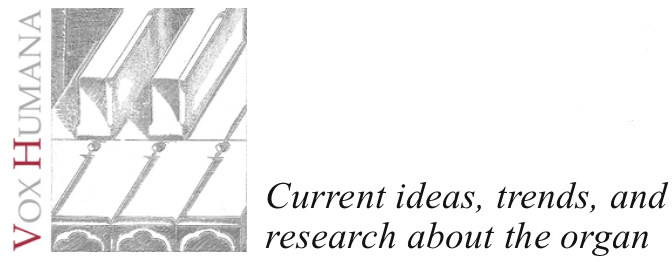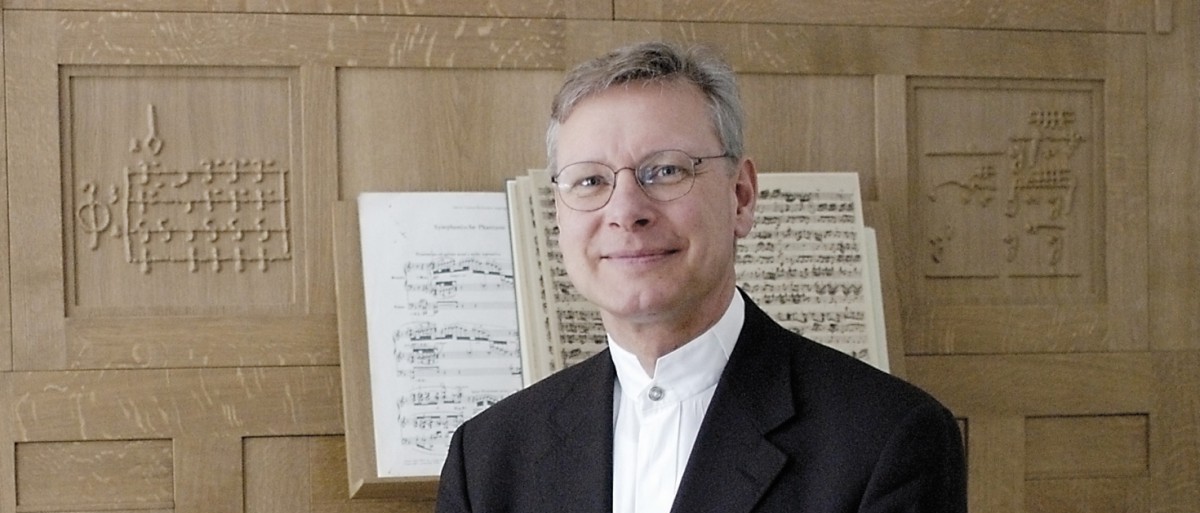


October 22, 2017
LUDGER LOHMANN
–––––––––––––––––––––––––––
Organ Music and Education in Germany

October 22, 2017
LUDGER LOHMANN
–––––––––––––––––––––––––––
Organ Music and Education in Germany

Introduction
Ludger Lohmann, Professor of Organ at the Hochschule in Stuttgart, discusses aspects of organ performance, culture, education, and competitions in Germany with Vox Humana Associate Editor Kirk Rich.
––––––––––––––––––––––––
Professor Lohmann, many thanks for agreeing to this interview. To begin, could you talk about your musical training? Did you study piano from an early age? When did you take up the organ, and what attracted you to it?
I did study the piano first, but only from the age of eight. When I was twelve, my piano teacher died, and since there was no real alternative for a piano teacher in my small town, I took up the organ, taking lessons with the local cantor who happened to have studied the organ with a Rheinberger pupil. As a twelve-year-old boy, I was, of course, attracted to the possibility of making a lot of noise without much physical effort, and to the technical side of the organ as well. So the fact that I later became an organist was more or less a coincidence.
I would characterize you as a specialist in German music, from early music, such as Buxtehude and Bach, up through the music of Brahms and Reger. You also have an immense knowledge of German music from the first half of the nineteenth century, such as Rinck, Mendelssohn, Ritter, and Reubke. I would also include Liszt as one of your specialties. Have you always been especially interested in German music?
Well, obviously, since Germany has contributed greatly to organ music. Also, even during the times of my professional studies German organ teachers didn’t teach much foreign repertoire. French music wasn’t played much (not the least because the music was expensive and difficult to get), let alone Italian, Iberian or Anglo-Saxon repertoire. I got interested in French repertoire, however, rather early, and was probably one of the first German organists to play a good amount of the French repertoire, both classical and symphonic, after having studied with Marie-Claire Alain.
You have a keen interest in articulation and touch at the organ. This was already evident from your doctoral dissertation. Those who heard your recital at the AGO National Convention in Houston last summer appreciated your attention to varieties of articulation and touch in everything from Buxtehude to Liszt. I will never forget your subtleties of touch in Brahms. To whom or what do you attribute your mastery of touch?
As far as articulation goes, I owe most to my harpsichord teacher, Hugo Ruf. I developed touch specific to the organ almost exclusively myself, being so lucky as having a very sensitive tracker instrument for practicing. When I became Anton Heiller’s student, he didn’t really change anything substantial in my touch; we just dealt with particular details of touch and articulation in particular pieces. The same goes for my studies with Marie-Claire Alain. Since these years, however, I further refined these matters greatly when working with my students. So, in a way, my students were and are, probably, my most important teachers.
Your career has encompassed just about everything an organist can do. You have been teaching in Stuttgart now for many years, you play recitals all over the world, and you were also a cathedral organist. What has this been like, and how do you balance work with personal time?
Difficult question! I can say that I still greatly enjoy all aspects of my professional activities — playing music for many different audiences, discovering and exploring historical and new instruments, teaching, even writing. Balancing this with a private life, which includes the life of a family with four, albeit grown-up, children, has never been easy, and the balance probably was always tilted too much towards the profession. At my age, however, the balance just needs to shift more towards personal time.
There are many organ students and multiple organ professors in Stuttgart. I would imagine this is one of the largest organ programs in the world at the moment. Are most of these students hoping to be professional church musicians, or will they pursue careers teaching and performing?
Almost all of my German students at least start out as church musicians. Being an organ recitalist isn’t really a profession, at least not a profession which can feed a family. Thus, I deeply admire my foreign students who devote so much time and effort to a profession which will later force them to lead a not very secure life as a freelancer.
You have served on many international competition juries. Are there certain trends you see, for example, in the sort of players who win first prize? Do juries tend to favor “safe” players or those with a unique voice? What do you listen for when you are adjudicating, and what advice do you have for young organists entering these competitions?
There are some artistic trends which you can notice over the decades, but the question whether it is “safe” players or individual artists who win competitions depends mostly on the individuals on the juries. A general trend may be that, nowadays, matters of personal taste on the part of jury members play a bigger role than, say, 30 years ago, which I find problematic. When listening to competitors, I try to stay away from my personal musical or stylistic preferences as much as I can. I try to base my judgment in the first place on professional criteria, which, apart from a secure performance, also include stylistic aspects and the more-or-less friendly way to deal with the instrument. So, I would like to encourage young musicians to be themselves, and not to try to gear their performances toward the presumptive tastes of jury members.
What are your observations about the differences between organ education in Germany and organ education in America, and what do you perceive to be the strengths and weaknesses of the different systems?
Since Germany, traditionally, has a clear separation between practical music education in music academies (Musikhochschulen) and musicology in universities (a distinction which is, however, gradually broken up), German music students are much less exposed to musicological research than American students. On the other hand, they are mostly better educated in music theory. A more practical difference is that the American education of organists places a lot of emphasis on playing from memory, which we don’t do in Germany. Though memorizing has many advantages, it usually keeps students from learning a larger repertoire.
What are your current research interests and projects? Do you have any forthcoming articles? When can we expect your comprehensive book on German Romantic organ music?
I actually have to start writing an article about Reger and Straube rather yesterday than tomorrow. As far as other writing projects go, my first priority is probably the book on German Romantic performance practice. There are three more projects for books, including one on symbolism in Bach’s chorale preludes, and I hope I will reach an age which allows me to achieve them.
––––––––––––––––––––––––
The views and opinions expressed in this article are those of the author, and do not necessarily reflect the position of Vox Humana.